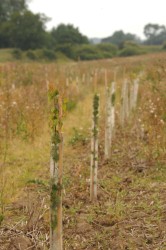 Short rotation coppice (SRC) is an energy crop which usually consists of densely planted, high-yielding varieties of poplar or willow. The woody solid biomass can be used in applications such as district heating, electric power generating stations, alone or in combination with other fuels.
Short rotation coppice (SRC) is an energy crop which usually consists of densely planted, high-yielding varieties of poplar or willow. The woody solid biomass can be used in applications such as district heating, electric power generating stations, alone or in combination with other fuels.
In the UK grants are available for the establishment of SRC plantations through the Energy Crop Scheme run by Defra, which aims to increase the amount of energy crops grown in appropriate locations. SRC can be planted on a wide range of soil types from heavy clay to sand, including land reclaimed from gravel extraction and colliery spoil. After four years the plantation will be ready for harvest, and coppice stems are usually cut and chipped by a dedicated SRC harvester in a single operation. SRC remains productive for up to 30 years before they require replacing.
Sustainably managed SRC provides a source of renewable energy with virtually no net carbon emissions (i.e. no increase in atmospheric carbon). Additionally, the plantations encourage biodiversity as they form an interesting alternative landscape and habitat type for wildlife.
There are environmental issues associated with using SRC for power generation, as a power station requires around 100 hectares (1 km²) of SRC for 1 MW of power capacity. Therefore the main barrier to establishing plantations is the cost as there is no financial reward for four years from a large initial investment. The current nature of the power industry generally requires flexibility in energy supply which is incompatible with the long term commitment SRC requires; however, there is much interest in SRC due to the need to reduce fossil carbon emissions. There are also issues associated with the high water consumption which is greater than for some agricultural crops.
Under correct management, energy crops are a sustainable fuel that can offer a significant reduction in net carbon emissions compared with fossil fuels. It is important that:
Forest Research provides a Woodfuel Information Pack which gives the key, basic information about the many aspects of using wood for fuel, including the use of short rotation coppice. This includes background on benefits, renewable energy targets and policy, sources, conversion, end users and systems.
Further information on many aspects of SRC for growers, researchers and the bio-energy industry can be obtained from:
Rolls, W. and Hogan, G. (undated) Short Rotation Coppice. Information sheet 3. Biomass energy centre, Forest Research, Farnham.
Tubby, I. and Armstrong, A. (2002) Establishment and management of short rotation coppice (PDF-116K) Forestry Commission Practice Note 7, Forestry Commission, Scotland.